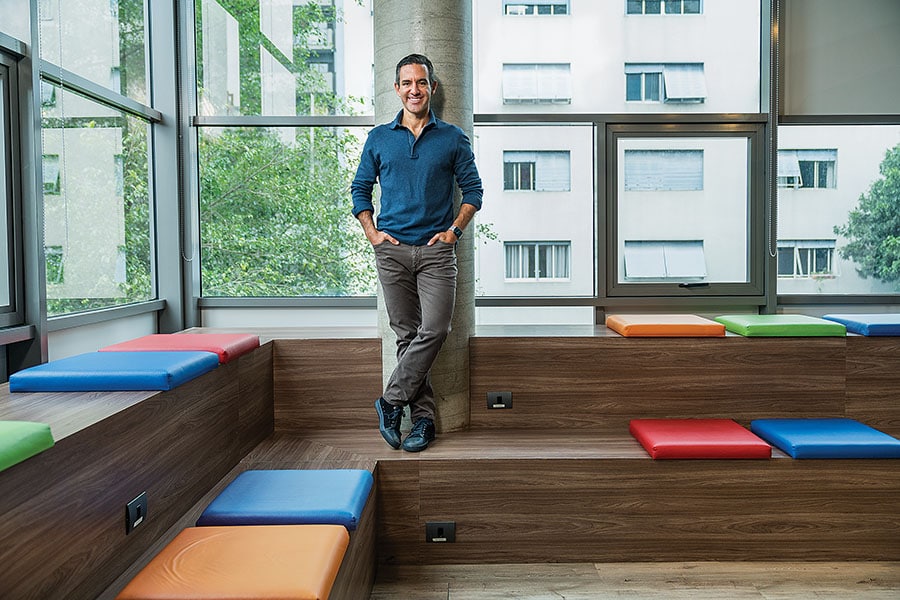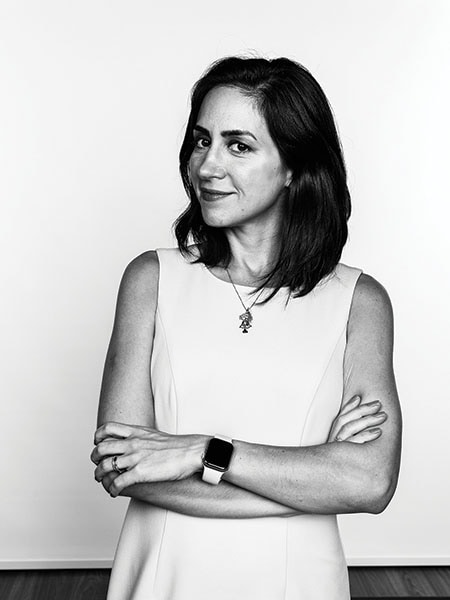In the summer of 2012, David Vélez moved to Sà£o Paulo with a Stanford MBA and a plum job as a Sequoia Capital partner. Douglas Leone, the head of Sequoia, had recruited the then-30-year-old Colombian to stake the venture capital (VC) powerhouse’s claim in Brazil—a youthful, resource-rich country of 200 million that had grown 4 percent a year for a decade to become the world’s seventh-largest economy. But on October 1, Leone called Vélez with bad news: After considering the uninspired pitches from Brazilian entrepreneurs and hearing that top-ranked University of Sà£o Paulo had produced just 42 computer science graduates the prior year, he was pulling the plug. Sequoia’s Brazilian adventure was over.
“It was the day before my birthday and it was a bit of a shock," Vélez admits. Still, he had always wanted to launch his own startup and saw opportunity in the very dearth of Brazilian innovators that had turned his VC compatriots off. “You want to position yourself on the side of the market where there’s scarcity," Vélez explains. “In the US, there’s an oversupply of good entrepreneurs. Somebody with my experience and background is a commodity. In Latin America, there was significant scarcity."
Before long, he had a target: Brazil’s big and—to hear Brazilians tell it—bulletproof banks. Yet as Vélez saw it, the banks, with their high fees, poor service and seeming obliviousness to new technology, were sitting ducks. And they were. Less than a decade after its founding, Vélez’s Sà£o Paulo-based Nubank has 35 million customers and is valued at $25 billion. Vélez, who is CEO, retains a 23 percent stake that Forbes values at $5.2 billion. “What’s happening in Brazil is nothing short of a real revolution. And it’s waking up the incumbent banks, who have had the going really easy for a long time," says Nigel Morris, the co-founder of Capital One and a Nubank investor.
“David is going to build a $100 billion–plus financial powerhouse in Latin America," predicts TCV partner Woody Marshall, another investor who has poured $1.2 billion into Nubank. Among the billionaire-backed firms betting on Vélez: Yuri Milner’s DST Global, Peter Thiel’s Founders Fund, Chase Coleman’s Tiger Global—and yes, Leone and Sequoia.
Equally impressive, Vélez built his fintech juggernaut while previously booming Brazil suffered through recession, corruption scandals and Covid-19. And he did so despite warnings from Brazilians that the banking establishment would block him—or worse. “‘They’re going to kill you,’"‰" Vélez says one friend told him. “‘They’re going to kidnap your kids.’"
*****
Growing up, Vélez saw how entrepreneurs persevere through adversity. Born in Colombia in 1981 into a family of small-businessfolk (his father’s 11 siblings are mostly entrepreneurs), he watched as his hometown of Medellàn was ravaged by drug wars. He remembers leaving a shopping centre with his family minutes before it was bombed. After an uncle was kidnapped and rescued, the then-9-year-old Vélez, his parents and his two sisters (both now also entrepreneurs) moved to Costa Rica. There, Vélez’s dad, who had co-owned a small button factory with two brothers in Colombia, built a new one.
![]() “If banks are Darth Vader, credit cards are the Death Star," says Cristina Junqueria, Nubank’s co-founder. “They’re the horrible weapon the banks used."
“If banks are Darth Vader, credit cards are the Death Star," says Cristina Junqueria, Nubank’s co-founder. “They’re the horrible weapon the banks used."
Image: Gabriel Rinaldi for Forbes
Vélez attended a local German-language prep school, graduating as valedictorian and winning admission to Stanford, where he majored in engineering and yearned to join Silicon Valley’s startup frenzy. But while Google had been birthed in Stanford’s dorms, as an undergraduate Vélez couldn’t come up with his own big idea. So he played it safe after graduation, taking an investment banking job at Morgan Stanley. Two years later, he joined private equity firm General Atlantic to build up its investments in Latin America. In 2010 he returned to Stanford for his MBA and, he hoped, to develop the concept for his own startup and the killer instincts to execute it. But while still a student, he was recruited by Leone to develop Sequoia’s Latin American business. When that opportunity evaporated, Vélez retreated to his parents’ Costa Rican home to plot his assault.
Vélez is an unlikely assassin. He’s an even-keeled manager who, before the pandemic, began meetings with a minute for meditation. In his spare time, he reads fiction. His favourite novel is Gabriel Garcàa Mà¡rquez’s One Hundred Years of Solitude. But he’s also a fan of Ayn Rand’s Atlas Shrugged, and he learned in his VC and Stanford days that an entrepreneur can hit it big by using technology to take out fat, complacent incumbents. “What’s the biggest industry in Brazil? Banking. And what’s the most profitable? Banking," he says.
Back then, five banks—Itaàº, Bradesco, Santander, Banco do Brasil and Caixa—controlled 80 percent of the Brazilian market, earning massive profits by lending at high interest rates and charging exorbitant fees while providing lousy service. “‘Brazilian banks suck. It has always been like this and will always be like this,’" Vélez says one Brazilian friend told him.
In the early 2010s Vélez saw broadband internet and smartphones spread across the country. “You had these gigantic opportunities [to disrupt] industries like banking that no one was looking at because nobody thought it was possible." He adds: “Nubank could never have been started by a local... It required a Silicon Valley investor who has seen this story of the ant going against the elephant and succeeding. A Latin American investor sees that and says, ‘No way, the elephant is going to crush you.’"
Vélez spent months chatting up Brazilian bank insiders and studying digital bank upstarts like Capital One in the US and ING Direct in Europe. He began to chart his course. Nubank would start with credit cards and then expand to other services, using technology to undercut the big banks’ fees and beat them on convenience. He returned to Sequoia’s Menlo Park, California, offices, securing $1 million from his mentor Leone and his former VC partners. Argentine venture firm Kaszek pitched in another $1 million.
![]()
“Nubank was in the right place at the right time with the right strategy," says co-founder and CTO Edward Wible. “All banks are becoming software companies."
Image: Gabriel Rinaldi for Forbes
Sequoia partner Roelof Botha told Vélez that he needed a co-founder with banking experience. Through an acquaintance, Vélez met and recruited Cristina Junqueira, a 30-year-old Brazilian engineer with an MBA from Northwestern’s Kellogg, who had just quit her job running Itaຒs largest credit card division. To build Nubank’s technology, he recruited as the third co-founder an American he knew from his Sequoia days, Edward Wible, a 30-year-old Princeton computer science graduate.
The trio set up shop in a rented Sà£o Paulo house. In August 2014, they raised $15 million in series A funding led by Sequoia, with Nigel Morris buying in through his specialty fintech VC firm, QED. To close the deal, Vélez took papers to the hospital for Junqueira’s signature—while she was in labour with her first child.
The next month, Nubank rolled out its first product: A credit card. Nubank couldn’t start with bank accounts because it faced a high hurdle to getting a bank charter—a Brazilian constitutional provision barring foreign bank ownership. But it didn’t need a banking license to offer credit cards. Plus, Brazilian credit cards had sky-high interest rates—200 to 400 percent a year—meaning customers would either have to pay off their cards in full each month or pay Nubank a small fortune. While Vélez aimed to make money primarily from interchange fees—the 5 percent of credit card sales merchants kick back to issuers and the banks—he wasn’t going to be shy about penalising late payers with interest and fees.
Rather than burn scarce cash on marketing, Nubank used the “velvet rope" strategy common in Silicon Valley—at the start you had to be invited by a friend to apply for its credit card. Faux exclusivity aside, the appeal for Brazilians was obvious: Nubank charged no annual fee and handled applications entirely through its app. Those who qualified were notified within minutes, and the cards arrived as soon as two days later. Plus, everything—from credit-line increase requests to bill paying and fraud reports—could be done through the app.
By contrast, almost all Brazilian banks charged annual fees for even basic credit cards—$20 the lowest. And that was just the start the banks also charged monthly fees for everything from fraud protection to text-message alerts. In 2019, fees made up nearly 40 percent of Brazilian banks’ revenue, compared with 15 to 20 percent for banks in Mexico, Argentina, Peru and Chile, according to a JPMorgan analysis. The big banks are still resisting, but Nubank is putting those fat fees under tremendous pressure.
*****
Brazil is the country of the future and always will be,’’ the old saw goes. That captures both the boom-and-bust nature of its resource-based economy and a sense that its vast potential has repeatedly been squandered. “The fact that everybody sees the macroeconomic picture and 99 percent of people get scared means it’s an opportunity for us to play the contrarian," Vélez says. “We think that over a period of 10 or 20 or 30 years, Brazil will find its way."
At the end of 2014, Brazil slipped into a deep recession. Yet just 12 months later, more than a million people had applied for a spot on the Nubank card’s waiting list. To protect itself from losses, Nubank approved only 20 percent of applicants and gave some ultra-low spending limits of $14, raising that only if payments were timely. And Nubank continuously tested new ways to use data to gauge risk—for example, considering not only an applicant’s own credit history, but the payment record of the referring customer.
In 2016, Nubank hit 1 million credit card customers—almost entirely through word of mouth and referrals—and Vélez was ready to step on the gas. That December, he closed an $80 million funding round led by Yuri Milner’s VC firm. To put the size of that in context, by PitchBook’s count, the rest of Brazilian startups combined raised $340 million in venture capital that year. Vélez used his portion of the stash to hire hundreds of tech workers, opening an office in Germany to get access to additional talent.
Finally, in May 2017, after a presidential decree gave it an exemption from foreign ownership rules, Nubank received a Brazilian banking license. Now it could offer its checking and savings accounts—all digital, naturally. While established banks were then charging as much as $10 a month per account—with extra fees for ATM withdrawals and other basic services—Nubank’s accounts were free, save for a passed-along $1.20 charge to use other banks’ ATMs. Within five months, 1.5 million of Nubank’s 4 million credit card customers had signed up.
Nubank was growing fast—it booked $523 million in revenue, with a $78 million loss, in 2019—when the pandemic hit. Then it started growing faster. Like other fintechs serving consumers, it benefited mightily from lockdowns and fear, as even older Brazilians took to banking via mobile phones and the web. In 2020, Nubank’s revenue nearly doubled, to $963 million, while losses narrowed to $44 million.
Not surprisingly, copycat digital banks are cropping up in Brazil, and the old-line banks are investing more heavily in technology. Some are even launching their own digital-only services. In response, Vélez is piling on new features. Last year, Nubank acquired a pioneering digital investing platform and rolled out a life insurance product, selling 100,000 policies in the first two months.
Such diversification is a holy grail for digital banks, but few have done it so successfully. “Nubank is the exception that proves the rule," says QED’s Morris. Customer satisfaction remains strong. In a recent JPMorgan survey, Nubank’s net promoter score (a measure of satisfaction) was 86, compared with 53 for Itaຠand 43 for Bradesco. “With Nubank, they show you what you can do, you press a button and it works," says Bruno Alves, a 28-year-old customer from Salvador, a city in northeastern Brazil.
Nubank expanded to Argentina and Mexico in 2019, and into Vélez’s native Colombia last year. While most meetings are conducted in English to accommodate its international staff, Vélez has no plans to compete north of the border.
Vélez met his wife, Mariel Reyes Milk, in 2013 at a gathering for international business types in a Sà£o Paulo bar. They are a global-village power couple: She has an American mother and Peruvian father and has lived in Uruguay, the US and the Philippines while working for the World Bank. Their three young children hold Brazilian citizenship Vélez himself is a citizen of both Colombia and Costa Rica. “My wife and I usually say that we have no nation, no roots," he joked to a Brazilian magazine in 2019. “We have lived in so many places and are considered gringos in all of them."
So while Vélez doesn’t plan to set up shop in the US, he’s considering taking Nubank public there, mostly as “a marketing event." But he’s in no rush. “We’re in the first second of the first minute of the first half of the soccer game," the congenial assassin says. “You always have to use a soccer analogy in Latin America."

 David Vélez, Founder and CEO of Nubank
David Vélez, Founder and CEO of Nubank “If banks are Darth Vader, credit cards are the Death Star," says Cristina Junqueria, Nubank’s co-founder. “They’re the horrible weapon the banks used."
“If banks are Darth Vader, credit cards are the Death Star," says Cristina Junqueria, Nubank’s co-founder. “They’re the horrible weapon the banks used."